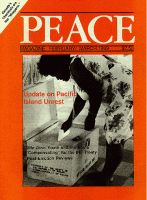
Peace Magazine Feb-Mar 1989, page 15. Some rights reserved.
Search for other articles by Metta Spencer here
What about the withdrawal of troops and tanks from Eastern Europe? Our editor asked the reactions of a distinguished former ambassador, who represented Canada both at NATO and at the United Nations
George Ignatieff: The withdrawal and disbanding of six crack tank divisions from GDR, Czechoslovakia, and Hungary is a step toward a defensive strategy in Europe. It is only ten percent of his standing army, and that he’s not taking any great risk in terms of the total Soviet forces, but it is important because he’s withdrawing the forward assault divisions. When I was in NATO, every discussion always focused on the fact that those Soviet forces are all set to move: “What do we do about those divisions?” Well, now, this really calls for some response from the West.
Announcing this reduction, Gorbachev’s saying that the Cold War is over. He says that the use (or the threat of use) of force no longer can be an instrument of foreign policy. What he’s saying is revolutionary – and it’s what the U.N. Charter says. We in Canada should especially welcome this assertion of what we worked so hard after World War II to put into international law. International disputes were to be settled by mediation and through the Security Council, and we’d set up peacekeeping forces. Under Stalin, we just couldn’t get the Soviets to implement this principle of the Charter. It was wrecked between ’46 and ’48 while I was at the U.N. as an assistant to General McNaughton. There was veto after veto on every effort to bring peace – the Mediterranean area, Kashmir, Indonesia.
But in his speech at the United Nations, Gorbachev emphasized that he is now willing to deal through the United Nations with all regional disputes and that he invites the U.N. not only to help the withdrawal in Afghanistan, but to use U.N. peacekeeping forces there when the troops are withdrawn.
And in the same speech, he announced Soviet plans for conversion to civil from defence industries industries. He said that it’s desirable for all states, beginning with the major military powers, to submit conversion plans to the U.N.
Metta Spencer: Inga Thorssen’s U.N. commission on Disarmament and Development several years ago had asked every country to develop such proposals for conversion. I think Sweden was the only country that actually did so.
Ignatieff: Well it would be a great thing for Canada to do because, under the defence sharing agreement, we are a subsidiary of the American defence system, making components for the American military machine. And under the Free Trade agreement, we will be drawn increasingly into that production system, to produce unusable weapons at tremendous expense to the taxpayer. The nuclear-powered submarine is only one example of the expenditures taxpayers will be expected to carry. There are also space-related weapons.
Spencer: Is Gorbachev changing the political dynamics in Europe, in your opinion?
Ignatieff: At the Pugwash meeting at Dagomys in the Soviet Union in September our German allies (even of the right, such as Mr. Kohl’s party) showed an awareness that they cannot carry German public opinion if they increase the risks of being the battlefield. The American air force contributes to this fear in Germany with low-flying planes that frighten the population and blow up towns by accident. When Chancellor Kohl visited Moscow he offered credits for the development of economic relations.
The Germans in Pugwash have taken the lead in insisting on a response to Gorbachev’s initiatives. At Dagomys they insisted on an immediate response to the Gorbachev proposal for global problems. There’s unbearable pollution in Europe – acid rain, greenhouse effect, ozone. They insisted on a resolution on the protection of the environment.
Another thing is going to have a big effect. With 1992 coming, when Europe will unify economically, relations between Eastern and Western Europe are more on people’s minds than the details of weaponry. The GDR already has close ties with the FGR and consider themselves, in effect, members of the European community. The Czechs and the Hungarians want to join too.
Spencer: Really? The Czechs and the Hungarians want to join the European Economic Community?
Ignatieff: Well, they want to have some relationship before the door closes. And the Soviets have agreed that they can do so. They are inviting closer relations between the members of the European Community and the Soviet Union in investment, energy, resources, and cooperation on environmental protection. We face the recovery of pan-European cooperation within a global framework, and strengthening the U.N. Our reversion to a continental approach is not sufficient. I am all for strengthening trade. I negotiated in GATT to that end and welcome any reduction in trade barriers, but it’s not in our interest to ignore Gorbachev’s enormous effect on European opinion. He is even moving Mrs. Thatcher. To maintain her hold over public opinion in Britain, and to keep in some kind of step with her European partners, she is taking initiatives in improving relations with the Soviet Union.
Spencer: But doesn’t she favor weapons modernization ?
Ignatieff: True. It’s connected to Britain ruling the waves with its Tridents. The French are also caught up in that.
Spencer: The main openness to Gorbachev is in Germany?
Ignatieff: Yes, the Germans hold the key to determine how the reunification of Europe is to be handled. There’s much to be hopeful about. I don’t remember a year since World War II when there have been more chances for peace!

Peace Magazine Feb-Mar 1989, page 15. Some rights reserved.
Search for other articles by Metta Spencer here